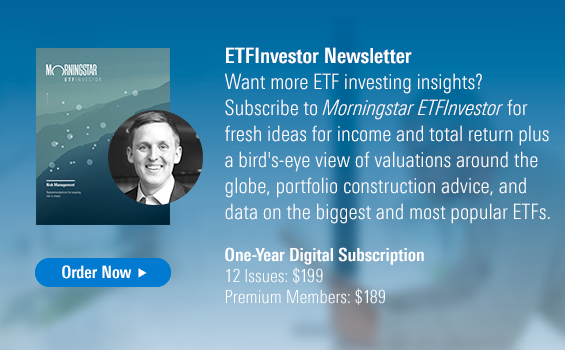This Core Bond ETF Looks Outside the U.S.
IShares U.S. Credit Bond differentiates itself from peers by including foreign issues.
Unlike its peers in the corporate-bond Morningstar Category that focus on domestic corporate debt, the fund's portfolio includes noncorporate issues such as supranational and sovereign bonds. These bonds improve the portfolio's diversification, but tend to offer lower yields than their corporate counterparts with similar credit ratings and terms. The fund allocates roughly 15% of its capital to noncorporate securities, while most of its category peers do not invest in them at all. The remaining 85% of the portfolio is predominantly invested in A- and BBB rated bonds. Market-cap weighting pulls the fund toward the largest debt issuers and allows the composition of the portfolio to change with debt issuance. However, it also reduces turnover and implementation costs, since it tilts the fund toward the most-liquid issues.
This fund's duration is in line with the category norm. As of February 2017, its duration was 6.8 years compared with the category average of 6.3 years. This fund is likely to respond to rate movements in a way similar to its peers.
The index-tracking record of the fund has been solid. From its January 2007 inception through February 2017, it gained 5.09% annually and the index returned 5.33%. But it lagged the category average by 17 basis points over the trailing 10 years through February 2017, largely because of its greater exposure to lower-yielding foreign-government bonds.
Fundamental View Investing in a broad market-cap-weighted bond index has advantages. For a low fee, the indexed portfolio replicates the composition of the fixed-income market and reflects collective views of market participants about the value of each security. But there are some drawbacks.
Market-cap weighting skews the portfolio toward the largest debt issuers, which may not offer the best potential returns. In the intermediate investment-grade corporate fixed-income market, there have been record debt issuances by U.S. financial institutions in recent years. During 2016 alone, U.S. financial firms issued $299 billion of debt, pushing the sector's total outstanding debt to $1.6 trillion as of December 2016, according to Fitch. The issuances were largely driven by low rates and postcrisis regulatory changes.
The portfolio is biased toward the financial-services sector, but this fund is more diversified than its peers. U.S. banks made up half of the fund's 10 largest positions, and the resulting financials sector exposure was about 20% as of February 2017. However, its single-sector exposure is typically less than its peers, whose exposure, on average, ranges from 20% to 30%. In fact, the fund's financials sector exposure ranks in the bottom 20% of the category. This is partly due to the fund's roughly 15% allocation to noncorporate bonds. Its typical peer invests 90% of its assets in corporate bonds, split between 85% in investment-grade and 5% in high-yield, which this fund avoids.
While the fund's sector distribution differs from the category average, its duration-risk profile is similar to the corporate-bond category average. As of February 2017, its duration was 6.8 years, a hair longer than the category average of 6.3 years. The fund will likely to move in tandem with its category peers when rates move.
This fund has tightly tracked its index. Over the trailing 10 years through February 2017, it returned 5.01% annually, lagging the benchmark by 25 basis points. This gap was a little more than the fund's annual cost of 15 basis points. Its five-year annual return was 3.3%, behind the category average by 50 basis points and ranking in the category's bottom 30%. This underperformance was largely driven by the fund's greater exposure to less risky supranational debt, which on average yielded less than 2%, coupled with its exclusion of high-yield debt. Its risk-adjusted return, measured by Sharpe ratio, was behind the category group average as well over the same period.
Portfolio Construction The fund earns a Positive Process Pillar rating because it accurately captures its target investment universe, which is sensible and investable at a low cost. Also, this fund skews toward the most-liquid securities, mitigating transaction costs.
The fund tracks the Bloomberg Barclays U.S. Credit Bond Index. The index measures the performance of investment-grade corporate debt and U.S.-dollar-denominated sovereign, supranational, and local-government bonds. Qualifying issues must have at least one year until maturity and have $250 million or more of outstanding face value. Also, they must be fixed-rate and nonconvertible bonds. The index may include large-, mid-, and small-cap companies from the consumer staples, financials, industrials, telecommunications, and utilities sectors. Securities that are not eligible include structured notes with embedded swaps or other special features, private placements, floating-rate securities, and bonds that are traded outside of their country of origin. The index is market-cap-weighted and rebalances on the last business day of each month.
Fees The fund has an expense ratio of 0.15%. While there are lower-cost alternatives, the fee is still competitive in the category. It earns a Positive Price Pillar rating. The corporate-bond category average fee is 0.40%, and this fund is cheaper than 70% of the category peers. However, this fund has tracked its benchmark successfully. From its January 2007 inception to February 2017, the fund lagged its benchmark by 24 basis points.
Alternatives

Disclosure: Morningstar, Inc. licenses indexes to financial institutions as the tracking indexes for investable products, such as exchange-traded funds, sponsored by the financial institution. The license fee for such use is paid by the sponsoring financial institution based mainly on the total assets of the investable product. Please click here for a list of investable products that track or have tracked a Morningstar index. Neither Morningstar, Inc. nor its investment management division markets, sells, or makes any representations regarding the advisability of investing in any investable product that tracks a Morningstar index.


/cloudfront-us-east-1.images.arcpublishing.com/morningstar/T2LGZCEHBZBJJPPKHO7Y4EEKSM.png)
/d10o6nnig0wrdw.cloudfront.net/04-18-2024/t_34ccafe52c7c46979f1073e515ef92d4_name_file_960x540_1600_v4_.jpg)